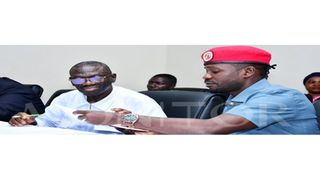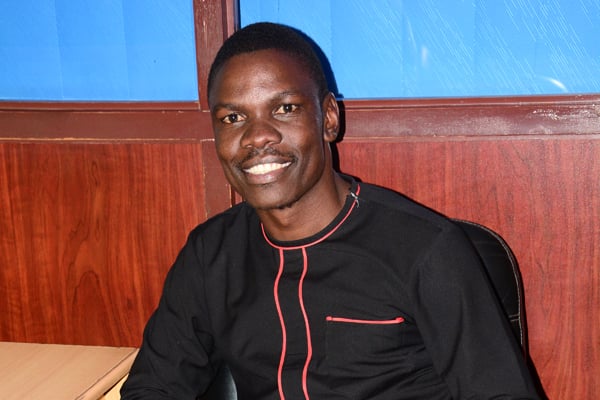
NUP party leader Robert Kyagulanyi, alias Bobi Wine (right), exchanging documents with the FDC founding president, Dr Kizza Besigye, during a joint Opposition press conference in Kampala on August 1, 2022. PHOTO | MICHAEL KAKUMIRIZI
|Special Reports
Prime
Hoops for Opposition to jump on voyage to victory
Uganda’s main Opposition political parties last week announced a cooperation agreement to work together to remove President Museveni, now in power for 36 years, including by means other than elections.
The courtship for a united front, which envisions vote boycott over alleged unending electoral theft, happened in secrecy and involved multiple meetings among the principals.
The announcement may have taken the nation by surprise, but the attempt is not new. In it, the Opposition has disproved naysayers that Mr Museveni’s opponents are fractured, but the actors leave open the question of how long the marriage will last.
The uniting Opposition players must remain consistent in their messaging, and do what they promise, if they are to be trusted and achieve results, argued Frederick Juuko, a professor of law at Makerere University and political commentator.
“They should be thinking about a way forward other than elections like they have always said. They have a huge task of calling their supporters to order in case they begin to turn guns against each other,” Prof Juuko said.
There are precedents giving rise to the doubts. In the run up to the 2016 presidential and General Election, then sacked prime minister Amama Mbabazi, who had been considered an election victory fixer for the ruling National Resistance Movement (NRM), had broken ranks to run against President Museveni, his long-time comrade-in-arms.
Mr Mbabazi, a former spymaster and multi-portfolio Cabinet minister, brought an assumed clout to glue the Opposition and moderate NRM members and share vote winning tricks to oust the incumbent at the ballot.
Yet, supporters gunned for Dr Kizza Besigye to take a fourth shot at the presidency.
Other Opposition leaders, among them then Uganda Peoples Congress (UPC) leader Olara Otunnu, a former United Nations under-secretary for Children and Armed Conflict, and Democratic Party (DP) president general Norbert Mao, guided by Bishop Zac Niringiye, struggled to coalesce.
They formed a political outfit called The Democratic Alliance, or TDA, as an umbrella body to field a joint presidential candidate, but months of negotiations, including a trip abroad to external diplomatic and political brokers, ended first in bickering, then a deadlock and finally a break-up.
In TDA’s last protracted leaders’ summit, dissenting supporters stormed the meeting room and physically extracted Dr Besigye, leading him back into the fold of Forum for Democratic Change (FDC) party, on whose ticket he had already run for president twice, in 2006 and 2011, and onwards onto the ballot as FDC presidential flag bearer in 2016.
Mr Mbabazi suffered a humiliating electoral defeat and later made up with the President whom he now serves as a special envoy. The incumbent, according to results announced by the Electoral Commission, defeated Dr Besigye a fourth time while other participating parties in TDA remained lost nationally and fractured internally.
UPC had a wing under MP Jimmy Akena, a son of the party founder, working with President Museveni in whose government the legislator’s wife, Ms Betty Amongi, is a Cabinet minister.
On the other hand, Mr Mao struggled then to calm his party convulsed by rebellious members some of who later joined the People Power movement headed by musician-turned-politician, Robert Kyagulanyi, alias Bobi Wine, before the outfit was registered as National Unity Platform political party.
Bobi moment
And when Bobi Wine plotted his maiden shot at the presidency, Dr Besigye, who had made the 2016 comeback despite pledging earlier not to run again, had turned a vocal critic of participation in presidential elections that he argued could not remove the incumbent from power.
Bobi Wine, much younger and idealistic, shot back that a four-time presidential candidate had no locus to claim elections do not work, or dissuade others from trying their luck. He proclaimed to “knock-out” Museveni at the ballot.
By this time, the differences of opinion between these principals had infected their supporters, who on social media, openly traded altercations, slurs and accusations of being a mole, much to the delight of NRM.
Even before the race for the 2021 vote got underway, the Opposition was polarised and under terror. Soldiers brutalised the NUP leader in Arua in 2018 in a manner that President Museveni mockingly described as being “beaten properly”, requiring Bobi Wine to seek treatment overseas.
Before, during and after last year’s elections in which Bobi Wine came second, and his NUP party amassed most Opposition parliamentary numbers to displace FDC as Leader of Opposition in the House, he and supporters were multiple times arrested, tear-gassed and incarcerated, with whereabouts of many still unknown. Elections, made worse by violence and alleged rigging deployed in parliamentary by-elections, the latest being for Soroti City East slot, do not work in Uganda, the NUP leader concluded, just as Dr Besigye had forewarned him.
He had come full circle that the birth of a common front gained an appeal between them, and other bigger players, culminating in last week’s big news.
It is in this context that some of the current actors that roped the new marriage argue that lessons have been learnt that mistrust, egoism and personality cult of the past have only returned defeat for Opposition and made the incumbent triumph.
“We are tightening the loose ends to see that our past does not come back to haunt us. This is going to be a people-centered campaign,” said Justice Forum (Jeema) party president Asuman Basalirwa, referring to the push for a united front to pluck out Mr Museveni.
A 2020 loose cooperation that some elements in the Opposition undertook to work as “united forces of change” had floundered, revealing more of what doesn’t work, rather than works, with Museveni opponents coming together.
While unveiling the new Opposition deal, leaders pledged fidelity to the cause.
That includes fielding joint candidates for MP by-elections and, where governance, electoral and legal reforms are unattainable, boycott the next elections altogether.
This is a proposal good on paper, but harder to enforce. When Dr Besigye broached the idea before and after 2016 polls, one intractable problem it birthed was with party members who are legislators. Incumbent and prospective parliamentarians raised a question which neither the past nor the new vote boycott block can answer: If they don’t participate in elections, what commensurate job or income alternative do the parent parties offer?
To other analysts, what unites the Opposition beyond removing Mr Museveni, and what happens next if he were gone today, remains unclear.
“They need to have clear objectives that are time-bound,” said Ms Sarah Bireete, a lawyer and executive director at Centre for Constitutional Governance.
She added: “They must remain consistent and work towards a common gaol which is removing the Museveni regime.”
Last month, the President fished Mr Mao, long looked at suspiciously by other Opposition leaders, into signing a cooperation agreement between DP and the ruling NRM.
A junior ministerial position and parliamentary committee chair and deputy chair positions have under the deal been dangled for other senior DP members to snap up.
That is a temptation difficult to resist if on a political dry land. The NRM already has a loose working relationship with a faction of UPC, the party that led Uganda to independence 60 years ago.
UPC has 10 members in the 11th Parliament who, added to DP counterparts signed to work with NRM colleagues, give the ruling party an iron-clad control over legislative, budgeting and accountability roles of the country.
That further whittles down the space for Opposition.
Nonetheless, Ms Bireete argues: “The Opposition has to remain focused on their agenda [to remove President Museveni], because that is what defines them.”
“Otherwise, DP and UPC risk being shut down and left with no space to work. The Opposition unity is possible,” she added.
It is not guaranteed that Mr Museveni’s government, with state apparatus and resources at its call, will rest and not seek to infiltrate or disorganise the Opposition, either through extending sweeteners or lashing with the stick.
Ms Miria Matembe, a veteran politician and former minister, said many of the Opposition politicians are seeking to get positions, and will not care about what it takes to unite.
Asked how they are strategising to confront the hurdles, NUP secretary general David Lewis Rubongoya, argued that “trust grows with time”.





